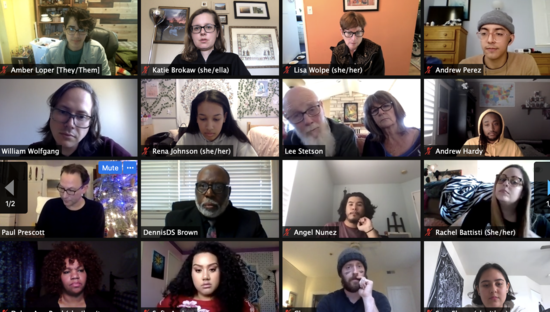Director Interviews: Katherine Steele Brokaw & Paul Prescott
Since we announced the performance release date for Shakespeare in Yosemite earlier this week, this felt like the perfect timing to present our interview with the directors of Imogen in the Wild: Dr. Katherine Steele Brokaw and Dr. Paul Prescott. Read on for more background behind the production, the company, and the rich cultural and ecological setting in which both have grown.

Cymbeline in the Anthropocene: Please describe what is unique about your theatre company and its approach to Shakespeare in performance.
Katherine Steele Brokaw & Paul Prescott: We are the only Shakespearean theatre company based in an American national park. We perform outdoors in Yosemite National Park and in Merced, California and will be filming our Cymbeline (which we call Imogen in the Wild) in both locations in spring 2021. We perform almost entirely in English, but have included bits of Spanish, American Sign Language, and South Sierra Miwuk (the language of the people indigenous to Yosemite) in past productions.
All of our productions are set in the present day, and in the specific ecological contexts of California. Ecology is at the heart of our mission, and our productions highlight a variety of environmental issues, from land use to animal rights to plastic waste.
Productions usually have between 16-20 actors, including two or three professionals, several UC Merced students, and a few local community actors. Our productions feature a lot of music, performed live, and we reuse and recycle as much as we can when creating costumes and props. Katie describes our mission in more depth in this recent episode of the Shakespeare Planet podcast.
CA: How has the Covid-19 pandemic affected your theatre practice and/or rehearsal process?
KSB & PP: We are making a film this year, and while we are sorry to not be gathering a live audience in beautiful Yosemite, we are really looking forward to taking up the challenge of film-making, and to being able to distribute what we do to the wider world. We have just begun rehearsing over Zoom, and plan to also do a few distanced, outdoor rehearsals, too.
We look forward to being able to feature the landscapes of Yosemite and California’s Central Valley in the film, something that wouldn’t be possible on a stage.

CA: How is your company adapting to the ongoing pandemic measures? Has the pandemic changed how you will perform for future audiences, and who that audience may be?
KSB & PP: When we gather to film, we will be testing people and wearing masks when not on camera, and most of our filming will happen outside. The biggest change for the future is that we would like to continue to make movies, and are hoping to film our 2022 live production of Love’s Labor’s Lost (postponed from 2020) for wider distribution.

CA: Have you adopted an ecodramaturgical approach to previous theatre work and/or other Shakespeare plays before Cymbeline? If you have, please describe one or more examples. How will those productions possibly influence your Cymbeline production(s)?
KSB & PP: Yes, ecodramaturgy is the heart of our practice, and our shows are part of Yosemite’s Earth Day programming every April. Our 2018 Midsummer Night’s Dream highlighted the human consumption and waste, and our 2019 As You Like It was about the ecological and emotional importance of forests. For As You, we hung trees around the venue with not only Orlando’s poems, but also with research conducted by UC Merced scientists on the effects of climate change on trees and other ecological issues facing the Sierra Nevadas (the mountain range containing Yosemite). All of these productions are collaboratively created, in consultation with National Park Service rangers (some of whom are also in our productions) and our cast and design team. That process has served us well, and is what we are doing with Imogen in the Wild, too.
CA: What are public attitudes towards climate change and environmentalism in your country and/or community? How will these affect your theatrical presentation?
KSB & PP: Well, it’s a real mix in the USA and in California. At UC Merced, who sponsors Shakespeare in Yosemite, climate research is very important, and we are the first university in the world to be carbon neutral, and to have all LEED-certified buildings. And, being in California, we are already experiencing the effects of climate change with the lack of water and the frequent and intense forest fires. So there is less denial of the problem in California than in other parts of the country, but there are nonetheless still people who don’t see the urgency of the problem or look the other way. We hope that our accessible, musical film invites all types of people into this conversation in a way that feels empowering, not threatening.
Archives
- December 2022
- October 2022
- September 2022
- August 2022
- July 2022
- June 2022
- May 2022
- April 2022
- March 2022
- February 2022
- January 2022
- December 2021
- November 2021
- October 2021
- September 2021
- August 2021
- July 2021
- June 2021
- May 2021
- April 2021
- March 2021
- February 2021
- January 2021
- December 2020
- November 2020
- October 2020
- September 2020
- August 2020
- July 2020
- June 2020
- May 2020
- March 2020
- February 2020
- January 2020
